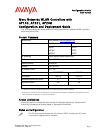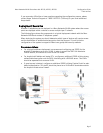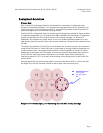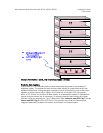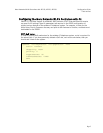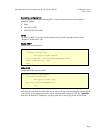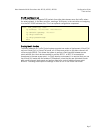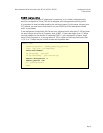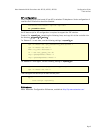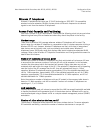Meru Networks WLAN Controllers with AP100, AP201, AP208 Configuration Guide
Field Verified
Page 10
Wireless IP Telephones
Wireless IP telephones use voice over IP (VoIP) technology on IEEE 802.11b-compatible
wireless local area networks (WLANs). Access points utilize radio frequencies to transmit
signals to and from the wireless IP telephones.
Access Point Capacity and Positioning
Each site is unique in its AP requirements. Please take the following points into account when
determining how many APs are needed and where they should be placed in the facility:
Handset range
There must be wireless LAN coverage wherever wireless IP telephones will be used. The
typical range for a wireless IP telephone is comparable to that of a laptop computer utilizing a
wireless LAN PC card. However, wireless IP telephones are likely to be used in areas where
data devices are not typically used, such as stairwells and outdoor areas. Wireless IP
telephones have a Site Survey mode that displays dBm levels to determine adequate WLAN
coverage. Refer to the
Wireless IP Telephone Installation and Configuration
document for
details about this feature.
Number of handsets per access point
Estimate the number of wireless IP telephones and their anticipated call volume per AP area
to ensure that the maximum number of calls per AP will not be exceeded. In this estimate,
consider the data rates at which the handsets will operate. Higher data rates can only be
sustained while well within the range of the AP. If the wireless IP telephones will be operating
near the limits of the RF coverage from the AP, they will automatically drop to 1 Mb/s
operation. Wireless IP telephones require approximately 15% of the available bandwidth per
call for 1 Mb/s operation, approximately 10% of the available bandwidth per call for 2 Mb/s
operation, approximately 7% of the available bandwidth for 5.5 Mb/s operation, and 5% of
available bandwidth for 11Mb/s operation.
Note: the maximum number of telephone calls per AP quoted in the summary table above is
based on 11 Mb/s operation, and will be reduced if some or all wireless IP telephones are
operating at 1, 2, or 5.5 Mb/s.
LAN bandwidth
Estimate anticipated peak call volume to ensure that the LAN has enough bandwidth available
to handle the network traffic generated by all of the wireless devices. Network traffic can be
monitored/analyzed using a network sniffer or a simple network management protocol (SNMP)
workstation.
Number of other wireless devices per AP
The wireless IP telephones share bandwidth with other wireless devices. To ensure adequate
RF bandwidth availability, consider the number of wireless data devices in use per AP.



